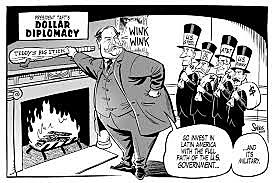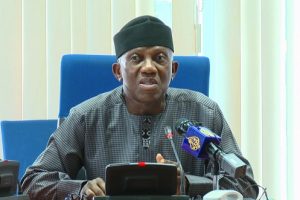
BY DESTA GEBREHIWOT
Dollar has starkly been at the epicenter of international diplomacy. Arguably, dollars have become more powerful tools than bullets to win the race for global hegemony.
The values of the currency have gone from economic transactions all the way to the marketplace of politics. Dollar is no just only serving as an international currency in global trade but it is also increasingly becoming a tradable commodity in the arena of political diplomacy.
The global currency is being used to impose countries’ political, economic interests on developing world. It has been used as instrument to boost allies yet also to intimidate, arm-twist adversaries.
The most valuable leverage in fact is the USD and cutting dollar in aid has been on the table of the powerful nations and its intensity has only increased. Dollar has become a modern-day carrot being used to weaken your opponents, boost the capability of the enemies of your enemies.
How a state is strong and positioned in global frontiers depends on how much dollar the country has. Here, how you get the dollars, all what matters is how much you have at hand.
Powerful nations have used both trade and aid as means of advancing their tailored policies in the developing nations. With aid and trade come preconditions and the end result of it has been imposition of socio-economic and political values. Mostly, erosion of indigenous culture and westernization became the face of the world as a repercussion.
The above approaches have indeed shaped world politics over the years as the economic gap between the developed and developing countries has widened. In contemporary global politics, cutting of aid and investment are becoming a weapon to intervene in sovereign countries’ affair.
This trend is forcing countries to find a gray line between receiving aid and exchanging trade and ensuring sovereignty. At the heart of the struggle for independence and uncompromised sovereignty is Ethiopia.
As history repeats itself, western countries are still trying to perpetrate colonial era’s guardianship role by coming up with narrowly defined dos and don’ts’ list. And, the instrument to do this is the dollars. The dollar is perfectly suited to perpetuate western’s political colonialism.
At the number one victim list of dollar diplomacy are African nations. How countries react to the unfair acts usually depends on the history and strength and unity of the people of the targeted country.
Ethiopia’s history clearly depicts that the country has till this day remained unconquered and did not succumb to foreign aggressions in spite of the varied approaches.
Most of the sacrifices Ethiopian forefathers made for were meant to defend the territory and sovereignty of Africa’s uncolonized nation. The pinnacle for the sovereignty was very much witnessed at the Adwa victory, where Ethiopians with old armaments had defeated the modernly equipped fascist Italian aggression force.
Ethiopia in this regard since long has good track record of standing up and persisting on the time of such pressures. Leaving aside the mentionable historical events, this year only the country stood firm at a time of unprecedented external pressure that was unleashed by powerful nation. Both the Grand Ethiopian Renaissance Dam (GERD) and the law enforcement operations in Tigray have been the target of dollar diplomacy.
On August 27, 2020, Foreign Policy (FP) indicated that: “Secretary of State Mike Pompeo has approved a plan to halt U.S. foreign assistance to Ethiopia as the Trump administration attempts to mediate a dispute with Egypt and Sudan over the East African country’s construction of a massive dam on the Nile River.
Similarly, the European Unions has warned of suspending aid to Ethiopia due to the ongoing law enforcement operation being carried out in Tigray.
With some super powers trying to unleash economic pressure and hand twist Ethiopia in relation to the ongoing GERD project and other sovereign issues experts argue African countries need to explore domestic capacities to curtail foreign dependency and ensure evolutionary economic freedom.
There has been some attempt from foreign powers to ratchet up economic pressure on Ethiopia to succumb the latter to Cairo’s Nile interests. And some argue that this is not a particular incident but of a continuation of foreign powers’ effort to economically colonize the African continent.
It is through building African local capacity and self-financed and run development projects like the GERD that countries would be able to defend their interests and relieve themselves from increasing external dependency many experts argued.
Dr. Getahun Fentaw, Head of Center for African and Oriental Studies at Addis Ababa University told The Ethiopian Herald that high dependence means little economic freedom. In fact debt and dollar are being used as new form of colonization these days.
Western countries provide debt under conditions and try to gain something out aid through imposition and dispensations of certain interests. The way out from foreign dependency is building African capacity.
Creating strong institutions, designing enabling policy, and intensifying domestic resource mobilization works are the way out from external dependency. What is more, identifying local resources and priority, encouraging private sector’s engagement and easing bureaucratic red-tape as well as promoting saving and investment are also instrumental to build domestic capacity.
“Engaging Diasporas in all development aspects and strengthening public-private partnership also brings about huge economic dividend by stimulating remittance and foreign direct investment.”
But domestic capacity can be built on the solid bases of inter and intra state peace and security, he hints. “Economic problems have also to do with political stability, lack of good governance and ethic fragmentation. Political stability should come first before economic prosperity, it is when peace and security are ensured that investment and economic activities could get boosted.”
The other point which is of critical importance in this regard is governments’ commitment in making sure that economic blocs are operating effectively, according to him.
“Regional integration should be realized more than paying lip services.” He said that certain restrictions should be lifted to aid trade and enhance African countries integration among one another.
Meanwhile, diversifying African financial sources and capitalizing on self-funding projects need to receive more attention as well. In this regard, GERD is a hallmark of self-reliance and a ‘yes I can’ model.”
Dr. Kasahun Delene Deyassa is co-founder of Global Pan Africanism Network (GPAN) and has been the Vice President of the organization since 2018. He recently also argued that African leaders shall implement and support agenda 2063 to free the interest of African peoples from external influences.
Rejecting the old fashioned propaganda’s and colonial treaties is the pillar for the future of African countries. All the current and the future diplomatic agreements shall concern the sovereignty of the African continent, he says, adding that the 7/20/14 (7 Aspirations, 20 Goals and 14 continental flagship project of the Agenda 2063) strategic plan is the most reliable asset of our future. African residents and Diasporas shall focus on the succession of these dynamic projects and continental programs.
The Ethiopian Herald December 11/2020



